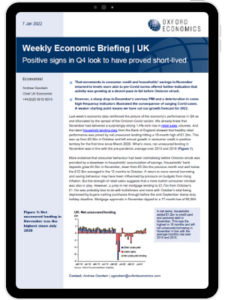Positive signs for UK economy in Q4 look to have proved short-lived

That movements in consumer credit and households’ savings in November
returned to levels more akin to pre-Covid norms offered further indication that activity was growing at a decent pace in Q4 before Omicron struck.
However, a sharp drop in December’s services PMI and a deterioration in some high-frequency indicators illustrated the consequence of surging Covid cases.
What you will learn:
- More evidence that consumer behaviour had been normalising before Omicron struck was provided by a slowdown in households’ accumulation of savings.
- Unfortunately, evidence of stronger activity in November looks to have been usurped by the consequences of the rapid spread of the Omicron Covid variant, a rise in the number of people isolating and increased consumer hesitancy.
- Moreover, the latest high-frequency indicators added to the evidence that the services sector has been hard hit by Omicron. CHAPS data on credit and debit card spending showed social spending in December averaged just under 90% of the February 2020 level.
Tags:
Related research

Post
House prices continue to slide for China’s cities
Research Briefing Positive signs for UK economy in Q4 look to have proved short-lived While the property market downturn has been universal, the scale and depth has been varied for different cities and regions.
Find Out More
Post
The Construction Productivity Challenge in Australia
Delve into the state of construction productivity in Australia. Understand the factors affecting growth and how innovation can transform the industry for the better.
Find Out More